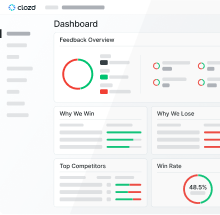Just like the best sports teams, top sales teams never miss a chance to review their game tape.
Sales recordings and post-mortems are great for analyzing what happened during sales calls, but the best way to uncover all the factors that played into a buyer’s final decision is to ask them directly. The best sales coaches base their coaching on qualitative win-loss analysis data—their sales reps’ real “game footage.”
In this conversation, Nick Kane, founder and managing partner of Janek Performance Group, joins Andrew Peterson, co-founder and co-CEO of Clozd, to talk about how top sales leaders need to leverage win-loss analysis data if they want to set their teams up to succeed in today’s sales environment.
What does it mean to "study game tape”?
Andrew
Those who are into sports recognize that every professional sports team that’s intent on reaching their full potential—or winning championships—does film study. They go back after a win or a loss and they review the game film to see how it really went.
You have perceptions of how it went from the experience itself, but your memories are often different than what you actually see in the game tape when you go back and watch what really happened.
It's a vital strategy that the best athletes in the world put into practice to make sure they can reach optimal performance.
Nick
I’m a die-hard Kobe [Bryant] fan. He was huge on game film and on going back and continuing to build that muscle memory. There are huge parallels between sports and sales—not just from a game film perspective, but also just this idea of mastering the fundamentals and sticking to the core of what makes an athlete (or sales rep) a top performer and a champion.
Kobe was the epitome of going back and developing his skills. You know, there's stories—he wasn't the greatest athlete growing up. He really had to build that muscle memory and those core skills. And a lot of that was going back, revisiting his past performances, and continuing to build his skills over time.
How can sales teams study game tape?
Nick
There are a variety of ways you can go back and review game tape in a sales environment. There are post-mortems and debriefs following sales interactions. You can record sales calls, then go back and review them looking for specific keywords—certain information that should be presented at certain times in the sales process. The ability to review calls and look for coaching opportunities to help reps improve their skills is important.
Andrew
I think more broadly about leadership at a company—how do they get a grasp of what's happening across deals? There are strategies for going back and reviewing a single deal or providing coaching to a single sales rep. But how do you zoom out if you're the coach and get a picture of what's happening more broadly across the entire team?
And that's where, in the last 10-plus years, the emergence of tools like Gong and other conversation intelligence tools has changed the sales landscape. You can go back and review a library of all your recorded calls and run analytics on those calls and start to paint a bigger picture. Sales operations teams try to dive into the CRM to see what data is in there that could help cobble together a picture for the leadership team about what's happening across deals: What are the themes and trends?
But one thing that we're starting to see is the emergence of disciplined win-loss analysis as a practice for more and more sales teams. Leaders are realizing that, ‘Maybe we're not capturing everything by recording the sales calls. Maybe we don't actually have all the answers about why the deal was won or lost internally within our business.’
Ultimately, the only person who has those answers is the prospect. And so how can we tap into the prospects and solicit their feedback to get a better understanding of why deals are won and lost? That’s the definition of win-loss analysis: It's the disciplined ongoing practice of soliciting feedback from the actual prospects—the buyers themselves—to understand why they did or didn't purchase. Then you aggregate that data over time so you have a clear and compelling view into why deals are won and lost for a leadership team to take action on.
Do sellers understand why they win and lose?
Andrew
As part of the Clozd Platform, we connect to our clients’ CRM systems. We see the data about all the deals that they're winning and losing—including sales-reported loss reasons that the sales reps have logged in the CRM. We've been able to systematically compare those to what the buyers then provide when they're giving feedback.
When we ran that data, we had expectations that sales reps would be incorrect a lot of the time—but we were shocked by the data because 85% of the time, the sales reps were completely wrong about why the deal was won or lost. The reason they tag in the CRM didn't match any of the four or five reasons that the buyer gave for their purchasing decision.
So in most cases, sales reps just don't know. They're not privy to the information.
There's a lot that's asked of reps in terms of CRM reporting already, and they might be in a hurry or lazy about the data they enter. There are a lot of reasons why the data could be wrong, but the fact is that it's wrong most of the time. And that presents a serious challenge for leaders who want to get to the bottom of what they can do as a business to improve win rates.
Nick
We consistently see that buyers don't want to give a lot of information to their seller directly. Even if you ask, and a client is gracious enough to share feedback, a lot of times that feedback is very general and surface level. And if they had an issue with the seller, they don't want to hurt their feelings—and they certainly don't want to damage their relationship should they have a chance to work together in the future.
So there's definitely some common gaps there—bad CRM data and reps not being able to gather really good information directly from the seller.
Are buyers willing to share candid feedback?
Andrew
If the sales rep is asking for feedback, the nature of a buyer’s response is going to be different than if they're responding to someone they perceive as being neutral, objective, and uninvolved in the sales process. So if you’re conducting win-loss analysis in-house, that might be someone else at the company from another function. Or it might be an entirely neutral third party that you're working with.
What we’ve found is that not every buyer is going to devote the time, effort, and energy to respond and provide feedback. But if you're reaching out post-decision with the help of a neutral third party, you'll often get 20–30% of your buyers to give you feedback. And that's if you're inviting them to participate in an interview, which is a fairly big commitment where they're going to spend 20 to 30 minutes talking through the decision-making process.
If you survey your buyers and expect them to fill out a survey as the mechanism for providing feedback, you're going to see much lower participation rates. With surveys, you can usually expect maybe 5% or less of your buyers to respond.
So it really comes down to the mechanism you're using.
Interviews are much more successful in terms of getting them to participate and getting them to share a robust, detailed explanation of why they made their decision.
How do companies use win-loss data to improve sales efforts?
Andrew
You can bucket the feedback and insights you get from win-loss analysis into two actionable categories:
- How can you improve your sales process to win more?
- How can the rest of the organization improve to enable you to win more?
We hear a lot of consistent themes about what sales teams are doing poorly that they can improve—like:
- The power of sales empathy and communication in driving deal outcomes on wins
- The level of influence or access to the decision-maker during the sales process
- The level of trust and professionalism that a seller established with the prospect
- Their knowledge and expertise in the product
- The quality of the sales process and follow-up
These are issues a sales team—or a sales rep—can take immediate action on.
The second bucket consists of things like:
- Serious product gaps that need to be addressed
- Issues with the pricing model
- How it's packaged
- The level of transparency
- The total cost relative to the competition
If your sales leadership team has the data to back these requests up and say, “Hey, product team. We really need to overhaul our user interface in our software product. It has to change. We're losing deals, and here’s the data to prove it.” That’s what's going to drive that change across the organization and get the things moving that the sales team needs to be able to win more.
Why is it important to study your wins?
Andrew
You've got to be getting feedback on your wins because it becomes your recipe for success. You need to know what resonated with the customers that chose to move forward. Then you can package those insights up and enable your team so it's easier for them to win in the future.
Oftentimes the silver bullet to how to win more is buried in the wins.
Nick
Kobe talked about that all the time. You can’t just look at the losses. Be brave enough to look at those—but the wins tell a whole different story. What am I doing well? Where have I improved?
What are common trends you uncover in win-loss interviews?
Andrew
In this day and age, everybody repeats Gartner research saying, “No one wants to work with a sales rep anymore.” Everyone wants to do their research on their own and buy offline—it's fascinating how in almost every single deal we analyze, the quality of the sales experience directly contributes to the win or the loss.
Sales performance is a critical factor in winning in this environment. Anyone who says otherwise just doesn't have access to this kind of data.
I don't know how else you would get accurate, candid feedback—or in essence, a scorecard—of how the sales team is doing without soliciting feedback from the prospects post-decision.
How can win-loss data empower sales leaders?
Nick
When the win-loss analysis data starts to point out some of those opportunities from a development standpoint, I think that's exactly where sales training partners like Janek come in.
We’re very prescriptive in our approach when we're partnering with clients to really understand where those gaps in the sales process are—and what competencies and skills need to be developed. Then we have a variety of training programs, delivery methods, ways in which we can support an organization in closing those gaps and ultimately drive high sales performance within those organizations.
How do you home in on the most impactful data?
Andrew
You don't want to overreact to a single anecdote—the one big deal you lost—and then assume it's representative of why you're winning and losing all your other deals. You want to have a disciplined process of analyzing as many deals as possible that are representative of your full pipeline. Then use a methodology like what Clozd offers—tagging key Decision Drivers that influenced each deal, aggregating those over time, and weighing how often they’re coming up and how strongly the sentiment (positive or negative) is influencing each deal outcome. This will help you see emerging trends and themes like, “Oh, the top reasons we lose are X, Y, and Z. And the top reasons we win are A, B, and C.”
It's very important that you step back and you look at the big picture. Back to the coach analogy: The coach isn’t just looking at one individual's performance, but trying to step back and look at the team as a whole. What can the team change strategically about their approach to the game to improve their likelihood of winning? As a sales leader, you want to do the same thing. Don't get hung up on one single anecdote. You want to look at the big picture.
For a personalized Clozd demo, sign up here.











.svg)



.png)







.svg)

.svg)




